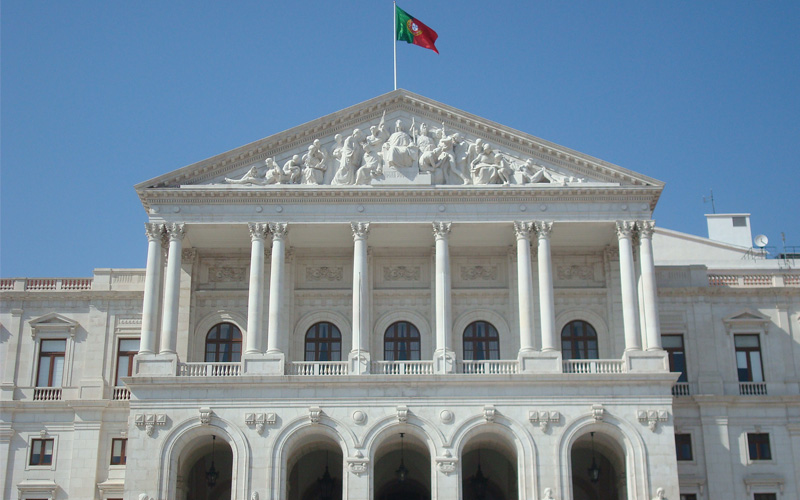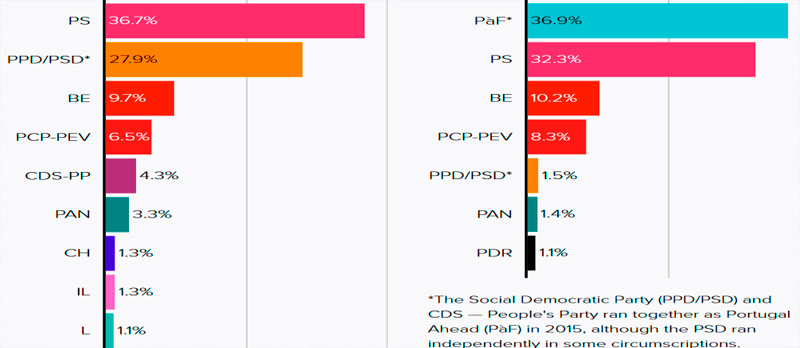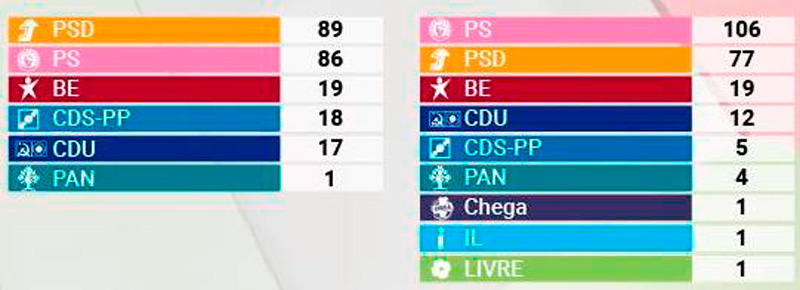
Legislative elections took place on 6 October. With the Europe and out of Europe constituencies yet to be determined, find below the results in comparison with 2015:
New Political Parties
The most relevant fact mirrors the electorate polarization and corresponding fragmentation of the parliamentary institutional framework. There are three new political parties: CHEGA (STOP); Iniciativa Liberal (Liberal Initiative) and LIVRE (Free).
CHEGA and Iniciativa Liberal arise as relatively unexpected phenomena. The former, a one-person party, translates, for the first time within the spectrum of the right-wing parties, a conservative agenda from the perspective of identity politics. One should not overlook the possibility of the time-factor to mitigate such a narrative given that its leader, André Ventura, was a member of the Social & Democrats. Iniciativa Liberal, in its turn, emerges with a liberal narrative, seeking to occupy the political ground that cost the job of the outgoing leader of the Popular Party, with a fresh and youngish rhetoric.
LIVRE can already be considered as an habitué. Led by Rui Tavares, former Portuguese MEP and member of the Left Bloc, LIVRE will aim at creating a contrast with its liberal and green agenda, notably through building bridges among the left parties. Although not elected in 2015, Rui Tavares can claim responsibility to having been the first to publicly come out with the idea of a left-coalition – subsequently materialized in “geringonça”.
Since the minimum criteria for the constitution of a parliamentary group is 2 MPs, none of the new parties qualifies. In comparison, PAN, moving from 1 to 4 elected MPs, will be able to constitute a parliamentary group for the first time, thereby participating and being represented in the sessions of the conference of leaders, in and through which the activities of the National Assembly are monitored.
Left and Right
The results announce a strengthened centre-left (PS) and a relative electoral stability of the most-left wing parties (Left Bloc and Communists). The Socialists were the only ones to be able to capitalize the governmental formula of the last 4 years through the ballots. Whilst the Left Bloc maintained the number of mandates, the Communists lost 5. These results set the tone for the post-electoral speeches: the Left Bloc tempered its rhetoric, calling for a new commitment, the Communists, through its leader, commented that the political framework has changed and pledged to vote case by case, in the Parliament.
The logic is simple: the last 4 years impacted in the communist’s electoral base; furthermore, establishing a contrast with the left bloc pushes the latter to the centre.
On the other hand, it should be noted the decline of the centre right-wing parties´ electoral base (PSD and CDS-PP). Altogether, the number of mandates does not equal the socialists´. Besides, the leader of CDS-PP, known for building bridges between liberals and conservatives within its party, has resigned. A new leader with a more conservative strategy is to be expected.
The Social Democrats, although inferior than in 2015, obtained a result higher than expected. Its leader, Rui Rio, has left some doubts as to his continuity, not only depending on internal opposing forces, but also on the day after the elections. Rui Rio will have to guarantee an arena to perform within the constraints imposed by the next parliament. Some analysist defend that the President of the Republic, Marcelo Rebelo de Sousa, which will seat the new Government until the end of the week, considers the Social Democrats as an important part of its concept of stability, given that, first and foremost, works as an obstacle for further atomization centre right-wing parties.
Future Governmental Formula
The Socialists levied the fruits of the past 4 years. The small share of the electorate lost for the Left Bloc and the Communists, was gained in larger proportion from the Social Democrats and CDP-PP.
Legislative Elections 2015 vs. Legislative Elections 2019
The strategy of the Prime-Minister caught most of the analysis by surprise. Charming new pawns without publicly dismissing past ones – that was the background of the post-electoral speech. When all analysts assumed that the more expressive the victory the smaller the need to open to other political parties, António Costa challenged all left-wing parties to form a consensus-based coalition, now with LIVRE and PAN. The widening of the range to the new parties may represent several things. Most immediately, it reverses the onus of responsibility to all left-wing parties. Thus, the Socialists have an alibi against drastic postures.
4 parties are aligned to negotiate in the Parliament. If electing 106 MPs as expected, a minimum of more 10 MPs is required to form an absolute majority. This absolute majority can be achieved through punctual agreements with all left-wing parties; only with the Left Bloc or with the Communists; or with the abstention of one of the latter and of the Social Democrats and of CDS-PP.
Independently of the final arrangement, the legitimacy acquired through this election points to a compelling fact: the last word as to the program of an eventual coalition, contrarily to 2015, remains within the realm of the Socialist Party.
Next Steps
The National Assembly will resume its works only after the National Commission for elections published in the official journal the final list of elected MPs. That is, at the end of October.
As to the National State Budget 2020, one detail should be highlighted: when the legislative term closes between 1 of October and 31 of December, the law foresees 90 days for the government to hand over the final version of the document – in this case, at the end of January. Given that, in general, the entry, discussion and approval take 2 months, the document will be approved by the National assembly in March.

